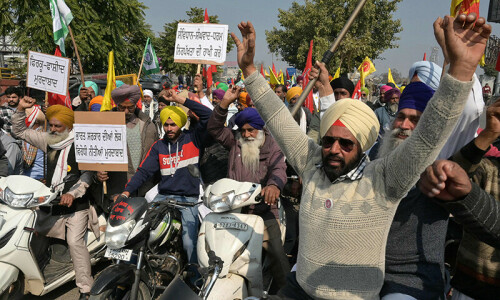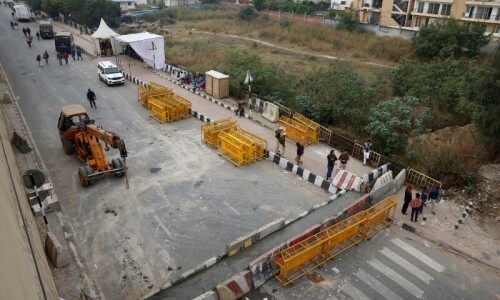Indian riot police fired tear gas on Wednesday at columns of farmers on tractors seeking to breach heavily guarded barricades and march on the capital to demand higher crop prices.
Farmers in India this week launched a “Delhi Chalo”, or “March to Delhi”, in an echo of January 2021, when farmers breached barricades and rolled into New Delhi on Republic Day during their then year-long protest.
But this time around, the lines of hundreds of tractors have been stalled by fearsome blockades of concrete blocks and lines of razor wire guarded by police.
The farmers are demanding a law to fix a minimum price for their crops, in addition to a clutch of other concessions including waiving loans.
Tear gas was fired at Shambhu, about 200 kilometres north of the capital on the border between Punjab and Haryana states where the main group of farmers has been stopped, AFP reporters at the scene said.
Farmers in India have political influence due to their sheer numbers, and the renewed protests come ahead of national elections likely to begin in April.
Two-thirds of India’s 1.4 billion people draw their livelihood from agriculture, accounting for nearly a fifth of the country’s GDP, according to government figures.
Tear gas dropped by drone
After first deploying tear gas on Tuesday, police fired fresh barrages on Wednesday, including dropping canisters from the air by drone as tractor-driving farmers tried to open the road by dragging barricades away.
“Heavy stones were pelted at policemen,” Haryana state police said in a statement on Tuesday night, reporting 24 officers had been injured.
Police have ringed the capital on three sides, blocking highways with metal spikes, blocks and steel barricades, while mobile internet services have been cut in parts of Haryana.
In places, ditches have been dug to stop the tractors.
Where farmers have not been able to breach the barricades, some have taken their tractors across the fields to skirt them.
Minister of Agriculture Arjun Munda said a law guaranteeing a minimum support price for crops “cannot be brought in a hurry”, the Press Trust of India news agency reported on Tuesday.
Talks with farmer unions continue, Munda said, while urging protesters to be “aware and alert” about those seeking to exploit demonstrations for “political benefits”.
Protests by farmers against agricultural reform bills in November 2020 lasted for more than a year, forming the biggest challenge to Prime Minister Narendra Modi’s government since it came to power in 2014.
Tens of thousands of farmers set up makeshift camps then, with at least 700 people killed during the protests.
In November 2021, a year after the protests began, Modi pushed through parliament the repeal of three contentious laws that farmers claimed would let private companies control the country’s agriculture sector.
Thousands of Indian farmers die by suicide every year because of poverty, debt and crops affected by ever-more erratic weather patterns caused by climate change.















































